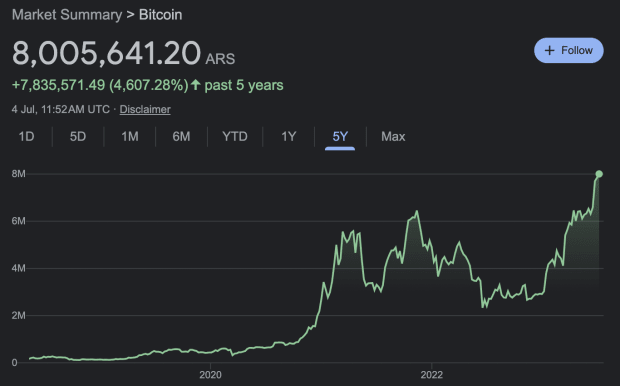[ad_1]
That is an opinion editorial by Ben Caselin, chief technique officer for cryptocurrency alternate MaskEx.
As we navigate the uncharted waters of the digital revolution, bitcoin is more and more discovering their footing in economies grappling with forex crises. International locations resembling Turkey, Lebanon, Nigeria and Argentina are already seeing bitcoin attain, or begin to approximate, new all-time worth highs, signaling a shift in wealth preservation and monetary sovereignty. The thrust behind this pattern is multifold, encompassing inflationary pressures, the worldwide dominance of the U.S. greenback and the distinctive attributes of bitcoin.
A fast Google seek for bitcoin towards so-called “weaker” currencies in rising markets, over a five-year time horizon, paints a transparent image.

Supply: Google
I’ve shared these observations earlier than in a Twitter thread and discussions on Elon Musk’s platform have been vigorous on the topic. Some people understandably see this as bullish and thrilling, nevertheless it’s vital to understand that such excessive worth motion basically stems from deep-seated forex failures and sometimes entails anxious struggling for individuals on the bottom. Others level out that these flailing currencies aren’t actually a benchmark for something substantial, however such pondering solely betrays hubris. It’s good to remind ourselves that some 85% of the world’s population lives in the emerging markets — removed from peripheral, the fact in these international locations is the dominant expertise and constitutes the mainstream.
Understanding ‘Weaker’ Currencies
To understand the Bitcoin phenomenon in these rising markets, we should first perceive the idea of “weaker” currencies. These are nationwide currencies usually characterised by excessive volatility, recurring devaluations and important inflation charges. Such susceptibility is mostly rooted in unstable home fiscal insurance policies, together with extreme authorities borrowing and overproduction of the cash provide. Nevertheless, the implications of such financial coverage aren’t contained inside nationwide borders; they ripple throughout the worldwide socio-economic panorama, together with within the type of migration and exacerbating inequalities.
Inflation erodes the worth of cash, diminishing buying energy and fostering financial uncertainty. When mixed with exterior elements such because the implications of the U.S. greenback’s standing as the worldwide reserve forex, the affect is much more profound. Regardless of increasingly-loud objections from the world over, with concepts of a “BRICS forex” floating around, the U.S. greenback remains to be the world’s main reserve forex and holds important sway over world financial stability.
The dollar’s dominance implies that many rising markets are inherently linked to the U.S. economic system. When the U.S. adjustments its rates of interest, engages in quantitative easing or when Jerome Powell initiates one other charge hike, the ripple results are felt far and broad. Rising markets might expertise outflows of capital, instability and elevated borrowing prices, intensifying financial challenges on the bottom.
A Digital Lifeline
Amid these complexities, bitcoin has gained important momentum. The explanations? It affords an escape hatch from financial volatility and a brand new method to retailer worth. The case of Venezuela, the place bitcoin adoption has been making headlines for years now, affords a vivid illustration. Hyperinflation has rendered the Venezuelan bolivar virtually worthless, pushing its residents towards bitcoin in addition to USD-pegged stablecoins for on a regular basis transactions and wealth preservation.
Nevertheless, the worth of bitcoin extends past its position as an inflation hedge. Its permissionless and peer-to-peer nature can be a recreation changer. Bitcoin is decentralized and requires no middleman for transactions, making it accessible to anybody, wherever, at any time. This attribute is especially interesting in areas the place banking companies are restricted or non-existent, fostering monetary inclusion.
For migrant staff sending remittances again residence, bitcoin — utilizing the Lightning Community — could make the method sooner, cheaper and extra environment friendly. It bypasses conventional banking methods and remittance service suppliers, which frequently cost exorbitant charges and are tormented by gradual transaction instances. Using bitcoin for remittances can stimulate financial exercise in these rising markets, contributing to its progress and growth.
Past Hypothesis: A Software For Monetary Empowerment And Stability
The rising acceptance of bitcoin in rising economies serves as a testomony to its potential to rework weak-currency environments and create extra resilient, people-centered monetary ecosystems. These developments level to an fascinating paradox: Whereas developed economies grapple with the query of Bitcoin’s position, partially pushed by a speculative bias born from the posh of extra capital, individuals in rising markets are already embracing its potential to redefine their financial landscapes, exactly for the explanation it was created within the first place.
Nonetheless, the journey of Bitcoin in these rising markets is simply starting. Challenges stay, together with these round regulatory uncertainties, digital literacy and technological infrastructure. However, if something, the surge of bitcoin in these economies signifies that when confronted with adversity, the innovation pioneered by Bitcoin has the potential to chart new pathways to prosperity.
In essence, Bitcoin’s rising affect in rising economies underlines its versatility, not simply as a speculative asset, however as a software for monetary empowerment and stability. The interaction between inflation, the U.S. greenback’s world dominance and Bitcoin’s attributes paints a compelling narrative of how the worldwide economic system’s future could also be reshaped by the digital forex revolution.
It is a visitor publish by Ben Caselin. Opinions expressed are completely their very own and don’t essentially replicate these of BTC Inc or Bitcoin Journal.
[ad_2]
Source link

